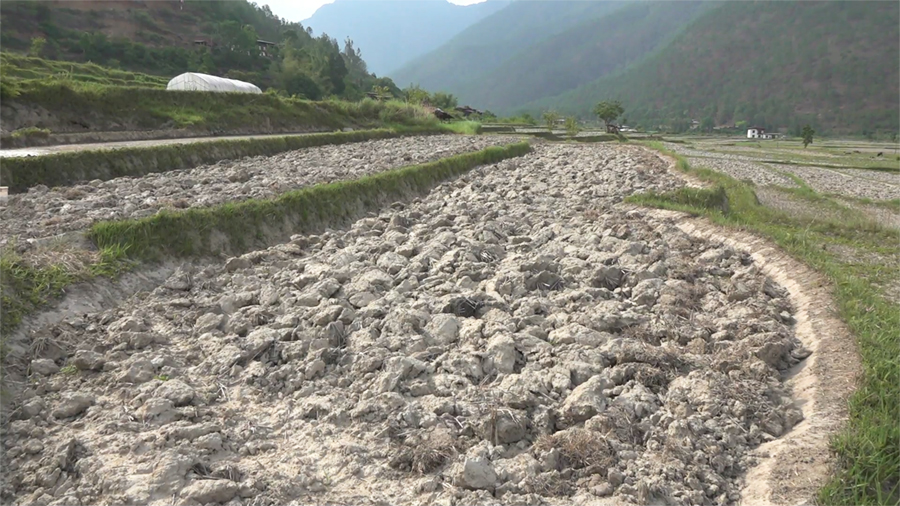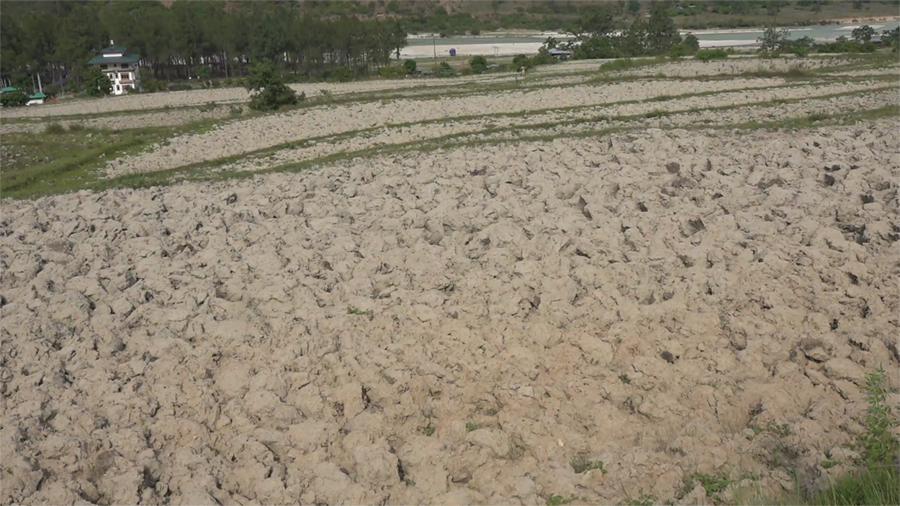
Farmers in Punakha are struggling with a shortage of irrigation water for their paddy fields. With no rainfall, many are worried about finishing paddy transplantation work on time. The issue is severe in two Chiwogs in Guma Gewog. Some farmers have not started transplanting, even though the season is halfway through. They say that under normal circumstances, they would have completed nearly half of their cultivation by now.

After waiting desperately, 66-year-old Rinzi Gyem finally got her turn to irrigate her paddy fields. She had only one day and one night to water her fields, which allowed her to water five terraces of paddy fields.
With most of her fields left to transplant, she is worried because her next turn for water is in ten days.
This is not the first time she has faced this issue; she managed last year, but this time is worse.
“I have about two acres remaining. I do not know what to do. I cannot even sleep at night. There is no rainfall and the irrigation water we have is not enough. Not even one terrace. I am worried how we will survive next year. The ration will not be enough,” said Rinzin Gyem, a farmer of Dochhukha_Dzomlingthang_Ritsa Chiwog.
Like Rinzin Gyem, all the farmers in Dochhukha_Dzomlingthang_Ritsa and Changyul_Lungsigang_Tashijong Chiwog are facing the same problem.
“Here, we do not have rainfall, neither irrigation water from source. The source has dried up and we have no alternatives. We think more fields will be left fallow this year compared to last year,” said Kinley Tshewang, another farmer.
To address the problem, the government arranged four water pumps from Farm Machinery Corporation Limited to supply water from the Mochhu River to these chiwogs as a temporary measure.
With this facility, some farmers are now able to carry out their paddy transplantation.
“The pump consumes about 90 litres of petrol for about an acre of land. So, about Nu 7,000 is spent in fuel. Each machine costs about Nu 2,000 in hiring charges. Without calculating labour charges, the pump costs us about Nu 10,000,” said Namgay Tshering, who is also a farmer.
“The two water pumps are not enough. If we are given four pumps then I think it will be sufficient,” said Daw Gyeltshen, a farmer.
Some farmers find it burdensome for both the government and themselves to arrange water pumps annually for paddy cultivation.
The pumped water often fails to reach the upper levels of their fields.
Dawa Gyeltshen, Tshogpa of Dochhukha_Dzomlingthang_Ritsa Chiwog said”Our people’s expectation is to have irrigation water supply from the Dungkar Rongchhu in Kabisa Gewog.”
“We asked for irrigation supply from the Rimchhu Rongchhu. But it is okay if we are given from Zoshi Stream since it will be enough. If that is given, forget us, it will benefit in the future. Last year was bad, but this year is even worse. The government has also incurred huge losses,” said Kado, a farmer from Changyul_Lungsigang_Tashijong Chiwog.
“We need water to work on wetlands. But there is no water. So, people say if the wetland can be converted to Kamzhing, so that we can at least construct houses and sustain from rent,” said Thinley Dorji, a farmer.
The Minister of Industry, Commerce, and Employment, who is also the MP for Kabji-Talo Constituency, recently met with the people of the two chiwogs.
He informed the public that the government is seeking funds to construct a permanent water supply system.
“We would be glad if it is included in the 13th Five-Year Plan. Even if it is not, the minister assured the public that there are several other avenues to secure the funding,” said Kinley Gyeltshen, Guma Gup.
Out of the total of about 500 acres of paddy fields in the two chiwogs, more than 65 acres were left fallow last year.
People transplant paddy from early May to the end of July.
Changa Dorji, Punakha
Edited by Sherub Dorji








